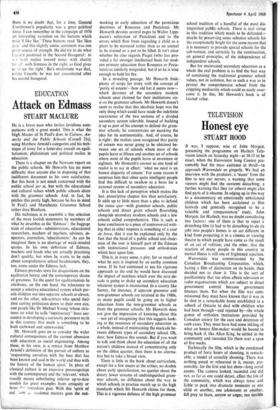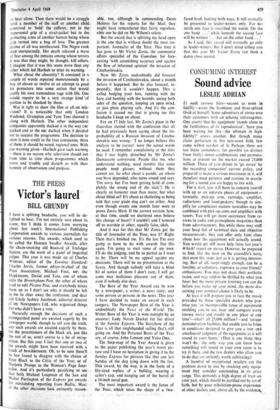Honest eye
TELEVISION STUART ROOD
It was, I suppose, wise of John Morgan, presenting the programme on Harlech Tele- vision lateish on Saturday night—at 10.15 to be exact, when the Eurovision Song Contest pre- sumably had the mass audience in thrall—to approach Warrendale so gingerly. We had an interview with the producer; a 'teaser' from the film to test our nerves; a warning that some viewers might find the contents disturbing; a further warning that they (or others) might also find parts of it obscene. In edging up in this way to a documentary on emotionally unbalanced children which has been acclaimed at film festivals and generally recognised to be a valuable and compassionate study, John Morgan, for Harlech, was no doubt considering two factors : one of them is that to inject a disturbing film (it had to be disturbing to do its job) into people's homes is an act different in kind from projecting it in a cinema or viewing theatre to which people have come as the result of an act of volition; and the other, that the reaction of many people in this country to mental illness is still one of frightened rejection.
Warrendale was -commissioned by the Canadian Broadcasting Corporation, which, having a film of distinction on its hands, then decided not to show it. This is the sort of pusillanimity that too often affects television or radio- organisations which are subject to direct government control because government finances them. Yet when the film was com- missioned they must have known that it was to be shot in a remarkable home established in a suburb of Ontario to deal with children who had been through—and rejected by—the whole gamut of orthodox institutions provided by Canadian society for the care and detention of such cases. They must have had some inkling of what an honest film-maker would be bound to bring back if, like Allan King, he settled in the community and recorded life there over a span of five weeks.
Technically the film, which is the condensed product of forty hours of shooting, is remark- able, a model of actuality shooting. There was nothing posed or rehearsed in it, except, pre- sumably, for the first and last shots—long aerial zooms. The camera looked,' recorded and did not, as far as one could detect, affect the life of the community, which was always tense and liable to peak into dramatic moments as one child or another, one adolescent or another, fell prey to fears, sorrow or anger, too terrible to bear alone. Then there would be a struggle until a member of the staff or another child contrived to 'hold' the sufferer, not in the impersonal grip of a strait-jacket but in the protecting arms of another human being whose grip turned into a hug of love. The greatest drama of all was unrehearsed. The Negro cook died unexpectedly. Her death released a wave of fear among the inmates among whose terrors it was that they might, by thought, kill others. I imagine that it was this scene more than any other which led Harlech to utter its warning.
What about the obscenity? It consisted in a couple of words repeated monotonously by a boy of eleven or twelve in an attempt to goad his protectors into some action that would justify his own tremendous rage with life. One would require to be a very strange kind 'of puritan to be shocked by them.
Was it right to show the film at all on tele- vision? It is noticeable that only London Weekend, Grampian and Tyne Tees showed it along with Harlech. The other independent companies apparently ducked it in the way cac ducked and as the BBC ducked when it decided not to acquire the programme. The decision to show it does credit to the four companies, three of them, it should be noted, regional ones. With due warning given—Harlech gave such warning —there is no reason why television should not from time to time show programmes which move and trouble and disturb us with their honesty of observation and purpose.



































 Previous page
Previous page